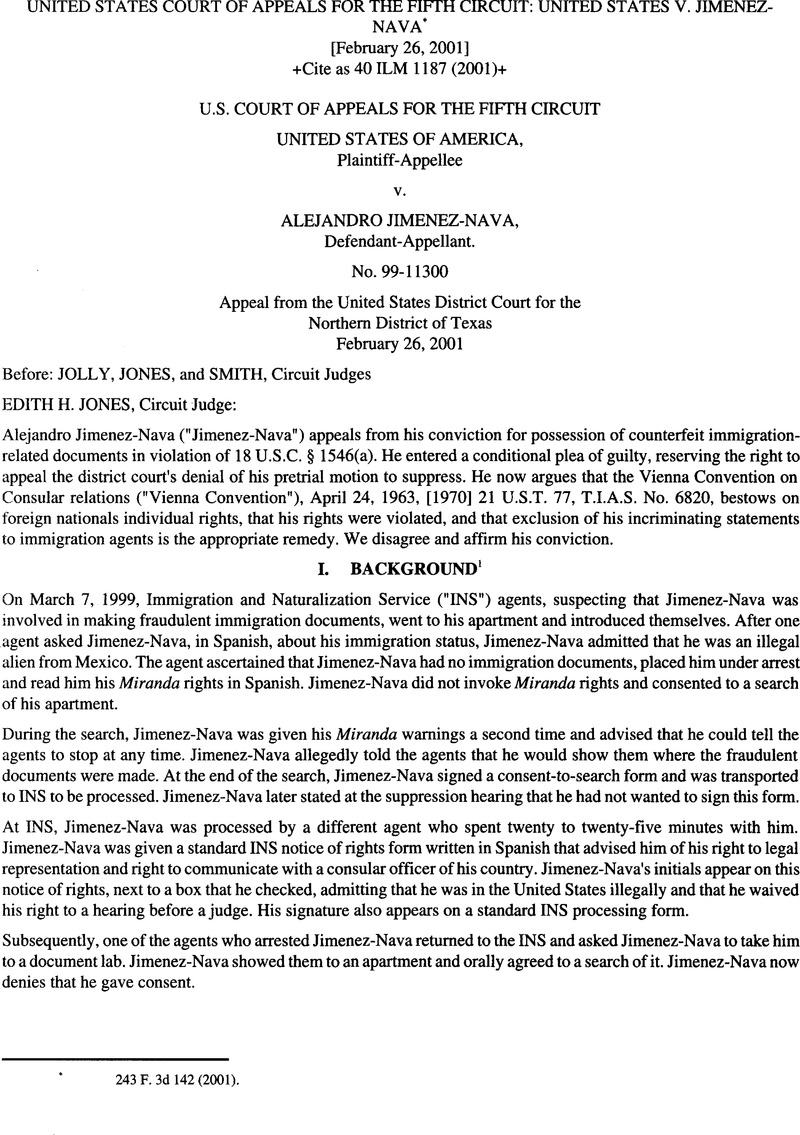No CrossRef data available.
Article contents
United States Court of Appeals for the Fifth Circuit: United States v. Jimenez-Nava
Published online by Cambridge University Press: 27 February 2017
Abstract

- Type
- Judicial and Similar Decisions
- Information
- Copyright
- Copyright © American Society of International Law 2001
References
End notes
* 243 F. 3d 142 (2001).
1 This recitation of facts derives from the suppression hearing.
2 In Faulder v. Johnson, 81 F. 3d 515 (5th Cir. 1996), this court stated that the treaty requires an arresting government to notify a foreign national of his right to contact his consul. However, this court found the violation of the Convention to be harmless error, not meriting reversal. This court later stated in Flores that “ [w]e do not read our opinion in Faulder as recognizing a personal right under the Convention. Rather, the panel dispatched the claim with its conclusion that any violation was harmless. Any negative implication inherent in rejecting the claim as harmless lacks sufficient force to support a contention that the panel held that the Convention created rights enforceable by individuals.” Flores, 210 F. 3d at 457. This court likewise did not reach the merits of this question in Flores because the defendant's assertion was at best Teague-barred. Id.
3 “[E]ven where a treaty provides certain benefits for nationals of a particular state — such as fishing rights — it is traditionally held that any rights arising out of such provisions are, under international law, those of the state and… individual rights are only derivative
through the states.” United States v. Gengler, 510 F. 2d 62, 66 (2nd Cir. 1974). See also United States v. Rosenthal, 793 F. 2d 1214, 1232 (11th Cir. 1986) (finding no merit in the defendants’ argument that the actions of the United States violated its extradition treaty with Colombia because “ [u]nder international law it is the contracting foreign government that has the right to complain about a violation“).
4 See United States v. Page, 2000 WL 1682523, *3 (6th Cir. 2000); United States v. Chanthadara, 2000 WL 1637516 (10th Cir. 2000); United States v. Chaparro-Alcantara, 2000 WL 1182450, *4 (7th Cir. 2000); United States v. Cordoba-Mosquera, 212 F. 3d 1194 (11th Cir. 2000); United States v. Li, 206 F. 3d 56 (1st Cir. 2000)(en bane).
5 The First Circuit posits that the Vienna Convention is facially ambiguous as to whether it creates individuals rights. See Li, 206 F. 3d at 62. For this reason, the court turns to non textual sources, including the State Department's interpretation, the legislative history and the treaty's historical application. While the court's analysis is informative, this court finds it unnecessary because the plain language of the treaty unambiguously did not create individual rights.
6 See e.g. Vienna Convention, Art. 27 (providing for the protection of the consular premises and archives in exceptional circumstances); Art. 34 (ensuring freedom of movement and travel to all members of consular post); Art. 35 (protecting freedom of communication for the consular post); Art. 41 (providing personal inviolability of consular officers); Art. 43 (providing immunity from jurisdiction for consular officers or employees with certain exceptions); Art. 44(detailing under what conditions consular post members either should or alternatively, may refuse to, give evidence in the course of judicial or administrative proceedings).
7 In the Head Money Cases, the Court stated that treaties may contain provisions which confer certain rights, but it implied that these are limited to matters concerning “municipal law” that “are capable of enforcement as between private parties in the courts of the country.” Head Money, 112 U.S. at 598, 5 S. Ct. at 254.” An illustration of this character is found in treaties, which regulate the mutual rights of citizens and subjects of the contracting nations in regard to rights of property by descent or inheritance, when the individuals concerned are aliens.” Id.
8 The Supreme Court later distinguished Rauscher on additional grounds, pointing both to Rauscher's reliance on the federal statutes and that the Court implied a term in the treaty “because of the practice of nations with regard to extradition treaties.” United States v. Alvarez-Machain, 504 U.S. 655, 660, 667, 112 S. Ct. 2188, 2191, 2198 (1992). Neither of these factors is present in the instant case.
10 Based upon this language and purpose, the Court has easily rejected a claim that two treaties providing that a nation “shall indemnify” or shall compensate private parties for certain damage inflicted on the high seas thereby created private rights of action cognizable in United States courts. Argentine Republic v. Amerada Hess Shipping Corp., 488 U.S. 428, 442, 109 S. Ct. 683, 692 (1989). The Court described these treaties as setting forth “only” substantive rules of conduct, not private rights of action. Id.
11 The State Department also asserts that suppression is an inappropriate remedy. See Lombera-Camorlinga, 206 F. 3d at 886 (“The State Department indicates that it has historically enforced the Vienna Convention itself, investigating reports of violations and apologizing to foreign governments and working with domestic law enforcement to prevent future violations when necessary.“).
12 Lombera-Camorlinga, 206 F. 3d at 888 (citing Restatement (Third) of Foreign Relations § 325 cmt. d (“Treaties that lay down rules to be enforced by the parties through their internal courts or administrative agencies should be construed so as to achieve uniformity of result despite differences between national legal systems.“)); see also Chaparro-Alcantara, 2000 WL 1182450 at *4 (“We also note that to impose judicially such a drastic remedy, not imposed by any other signatory to this convention, would promote disharmony in the interpretation of an international agreement. “)(citing Restatement (Third) of Foreign Relations Law § 325 cmt. d (1987)).
13 This analysis renders it unnecessary to construe the “without delay” provision of the Article 36




